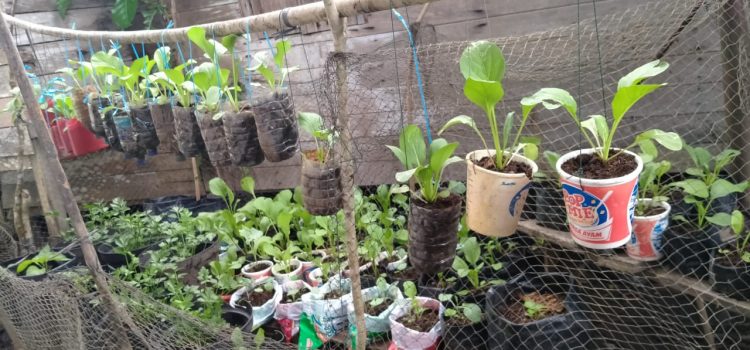
“Working together to plant and care for crops has become a symbol of community-based food resilience.
By growing their own food, families feel safer—because they know exactly where their food comes from.”
Growing Organically from Limited Space
When people hear the term organic vegetables, they usually think of crops grown without chemical fertilizers or pesticides.
That’s exactly what the Sinar Pagi Women Farmer Group (KWT) does in Keranji Hamlet, Tanjung Mekar Village, Sambas District.
This hamlet is one of the Gemawan Association’s assisted areas, where most women work as traditional weavers.
One of the driving figures, Budiana, became concerned about the environment and the limited land available in her community.
Motivated by that concern, she initiated an organic gardening movement from home yards, encouraging housewives to use small spaces to grow vegetables in polybags, used detergent pouches, cooking oil containers, and even large bamboo tubes as planting pots.
Starting the Food Security Movement
With facilitation from Gemawan and Agricultural Field Extension Officers (PPL) from the Department of Agriculture, KWT Sinar Pagi was officially formed in 2017 under the leadership of Karnatik.
The group consists of 20 women committed to cultivating organic vegetables in their home gardens.
They grow various vegetables—mustard greens, spinach, kale, celery, eggplant, chili, tomatoes, lettuce, radish, long beans, corn, and mung beans.
This activity not only ensures healthy food for their families but also opens new economic opportunities.
The group receives continuous support from the Department of Agriculture, including seed assistance, training programs, and product promotion.
Within just three months, the vegetables are ready for harvest and sold through various channels—PKK (Women’s Organization) events, government exhibitions, and even online via social media.
Some customers come directly to the women’s homes to pick fresh vegetables straight from their yards.
Home Gardens as a Path to Resilience
Home gardening has proven to be a practical solution for family food needs.
The vegetables are more hygienic since they use homemade organic compost instead of synthetic fertilizers.
The collective spirit of mutual cooperation (gotong royong) in planting and maintaining gardens has become a symbol of community-based food security.
By growing their own crops, families feel more confident about what they eat—because they know its source and quality.
The enthusiasm and persistence of KWT Sinar Pagi have inspired many others.
The group has become a learning site for other communities, such as the KWT from Paloh District, who visited to observe and learn best practices.
During the visit, Sinar Pagi members shared experiences on managing small plots, making organic fertilizers like pineapple MOL (Microorganisme Lokal), and turning limited yard spaces into productive gardens.
Visitors were eager to practice these new techniques, experimenting with homemade fertilizers and alternative planting media made from household waste.
Women Cultivating Sovereignty and Sustainability
What these women in Keranji Hamlet are doing proves that food security can begin at home.
Organic farming is not merely an alternative—it is a path toward food sovereignty that is environmentally friendly and sustainable.
In their village, fresh organic vegetables are always available—chemical-free, nutritious, and supporting family health.
Today, KWT Sinar Pagi even supplies compost to other organic farming initiatives.
Ongoing assistance from Gemawan and agricultural extension officers ensures that the movement continues to grow while strengthening family economies.
The passion for planting fruits and vegetables has turned homes across the hamlet into community-based urban farming models—living examples of how sustainability starts in the backyard.
This initiative is expected to inspire other villages and communities to follow suit.
Unused or narrow plots can become productive green spaces, contributing to both family nutrition and environmental well-being.
It all begins with small, consistent steps—cultivating healthy habits, caring for the earth, and reclaiming the right to feed one’s family sustainably.
Writer: Siti Rahmawati, Gemawan Activist
